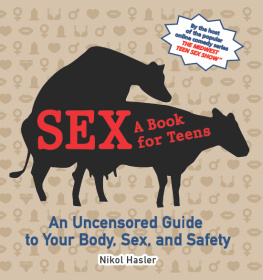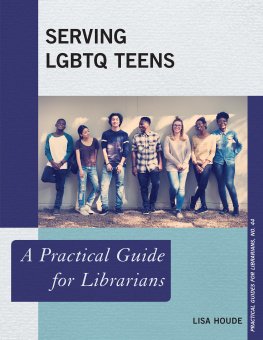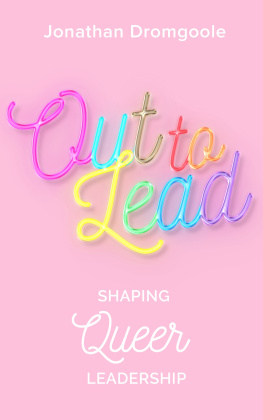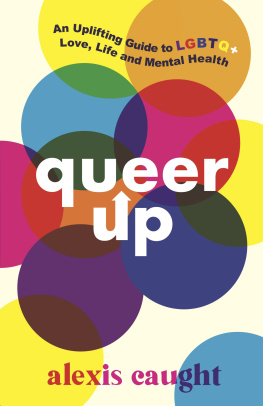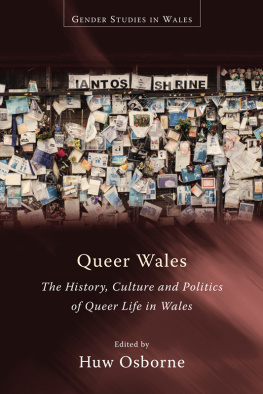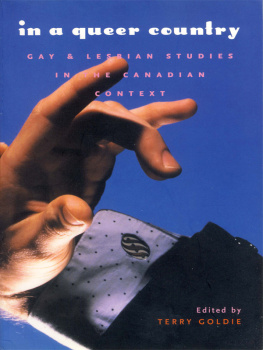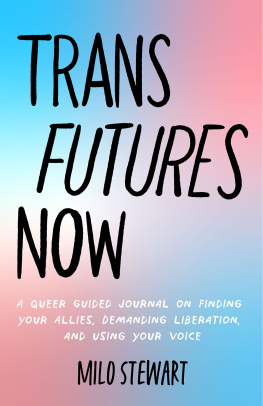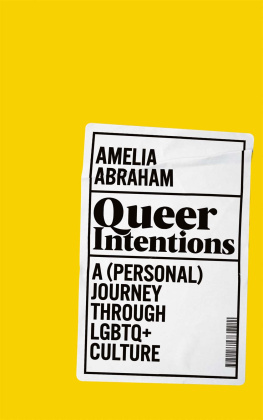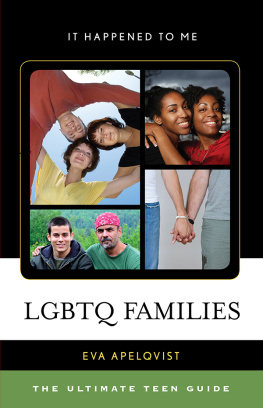
First published in 2011 by Zest Books
35 Stillman Street, Suite 121, San Francisco, CA 94107
www.zestbooks.net
Created and produced by Zest Books, San Francisco, CA
2011 by Zest Books LLC
Typeset in Cochin and Scala Sans; Title text set in Scala Sans
Teen Nonfiction/Social Issues/Homosexuality
Library of Congress Control Number: 2010936579
ISBN-13: 978-0-9819733-4-0
ISBN-10: 0-9819733-4-5
All rights reserved. No part of this publication may be reproduced or used in any form or by any meansgraphic, electronic, or mechanical, including photocopying, recording, or information storage and retrieval systemswithout the written permission of the publisher.
CREDITS
EDITORIAL DIRECTOR/BOOK EDITOR: Karen Macklin
CREATIVE DIRECTOR: Hallie Warshaw
ART DIRECTOR/GRAPHIC DESIGNER: Tanya Napier
COVER DESIGNER: Tanya Napier
PRODUCTION ARTIST: Marissa Fiend
ILLUSTRATOR: Christian Robinson
RESEARCH EDITOR: Nikki Roddy
MANAGING EDITOR: Pam McElroy
ADVISORS
TEEN ADVISORS: Sara Balabanlilar, Anna Livia Chen, Danielle Dokes,
Danny Vanity, Alex Weick
Manufactured in Singapore
TWP 10 9 8 7 6 5 4 3 2 1
4500276289
Every effort has been made to ensure that the information presented is accurate. The publisher disclaims any liability for injuries, losses, untoward results, or any other damages that may result from the use of the information in this book.
FOREWORD
Y ears ago, when we were growing up, the world was a different place. We didn't know too many other queer kids or adults. Many people felt forced to lead their lives in the closet. There were rumors, of course, like ones about the two goth boys who spent every waking moment together, or about the supposed relationship between the gym teacher Ms. Mason and the science teacher Ms. Lewis. But most people just weren't out the way they are now. Words like gay and queer were usually used as insults. The few brave kids who dared to take a same-sex date to the prom made the evening news. (They still do in some parts of the country!)
With a little luck and a lot of pride, we both made it through. We found queer friends, queer loves, and careers as writers who teach the world about the awesomeness of queer life. Our paths weren't without a few struggles, and we had to deal with a lot of confusion and discouragement. But we couldn't change who we were, and we never gave up following our dreams.
Being a queer or questioning teen still has its ups and downs. You've got to deal with coming out, trying to find your community, dating within a sometimes limited dating pool, and coping with discrimination from people who just don't get it. But if you're growing up queer today, you also have a lot to be excited about. Queer teens are coming out younger and younger, championing queer rights, starting up Gay-Straight Alliances, and, most important, talking to each other about what it means to be gay, straight, bisexual, or transgender. You're part of a whole new generation of queer and queer-friendly youth, and we wrote this book for you.
Inside, we'll talk about what it means to be queer and guide you through the stages of coming out, finding your people, dealing with haters, and scoring dates. We'll also tell you some funny (and not-so-funny!) stories about our own experiences of coming into the world as queer people. And you'll also get a taste of the rich legacy of queer art, humor, and history handed down from our queer forefathers and mothers. Queer life can be really juicyand you're about to find out how.
Whether you're sure you're queer, wondering if you might be, or just want to know more about what it all means, this book is your ticket to a whole new rainbow-colored world.
Kathy Belge and Marke Bieschke
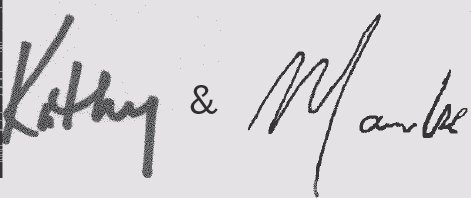

THE
Q
WORD
AM I QUEER?
If you're a teen, you have a lot on your plate: school, family, social drama, body issues, how to get that relative who perpetually smells like onions to stop sitting next to you at every family gathering. As if that weren't enough, some of you have one more thing to deal withthe possibility (or reality) of being queer. This realization is definitely not a bad thingbut it can throw you for a loop.
To best grasp what may be going on, you're going to have to spend some time looking within. That doesn't mean staring at your belly button, pondering the cosmos, the existence of God, and what Lady GaGa's going to wear nextthough if any of that is helpful, go for it. But you will need to do a little soul searching.
Lots of teensstraight or queerhave questions about their sexuality. It doesn't always feel clear cut from the jump. Have you ever asked yourself any of the questions below?
- I am a girl and I have a boyfriend. But I fantasize about kissing my best girlfriend. Does that make me bisexual?
- I think anyone can be sexy, regardless of gender. What does that make me?
- I am a girl and sometimes I feel more like a guy. Does that mean I'm transgender?
- I am a guy and I keep having dreams about my girlfriend's brother. Am I gay?
If so, you probably want answers. Well, here's the good news: You don't need an answer to this today. Here's the even better news: Whatever the answer is, it's completely fine. Being straight or queer doesn't define who you are as a person. It doesn't say whether you're a good friend or a complete jerk or whether you should do ballet or go out for varsity football. It's just about who you are attracted to and, in the case of transgender people, what gender you want to live as. Any answer is the right one. And it's also OK if that answer changes at some point. It's all good.
WHAT DOES IT MEAN TO BE QUEER?
To identify as queer means to see yourself as being part of the LGBT community. That means you consider yourself to be lesbian, gay, bisexual, or transgender. Here's the breakdown.
Lesbian
Lesbians are women who are emotionally and sexually attracted to other women. The Greek poet Sappho, who lived during the sixth and seventh centuries, wrote about loving other women. She was born on the island of Lesbos, and this is where the term lesbian comes from.
There is no typical lesbian. Some lesbians consider themselves to be butch lesbians (also known as studs), which means they express themselves in what society might consider a masculine manner. Butch lesbians might feel more comfortable dressing in men's clothing, playing aggressive sports, working a traditionally manly job, or being the person who is more chivalrous in a relationship. Femmes (also known as lipstick lesbians), on the other hand, usually dress in a more feminine manner, wear make-up, have long hair, and enjoy activities more associated with girly-girls, like maybe shopping or watching chick flicks.
Of course, not all femmes wear lipstick, and not all butches work in construction. And some lesbians call themselves futch, a combination of femme and butch. There are also blue jean femmes (a femme who doesn't wear dresses) and soft butches (those who consider themselves a less hard-core form of butch). Boi is another term, which can indicate a hip, youthful butch who may or may not identify as trans. But remember that all of these are just labels that help lesbians clarify their social identity, and the definitions are changing even as we write this book. Not everyone uses these terms, and some people find that their relationships to masculinity and femininity change over the years. If none of these labels feel appropriate for you, feel free to make up one of your ownor go without a label altogether. These identities are really about celebrating yourself and your queerness, not bogging you down.

